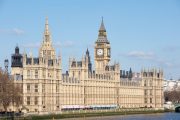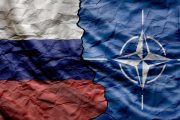French President Emmanuel Macron (shown) argues that nationalism was the cause of the First World War, but the more likely culprit is the globalism he espouses.
“By putting our own interests first, with no regard for others, we erase the very thing that a nation holds dearest, and the thing that keeps it alive: its moral values,” French President Emmanuel Macron said Sunday at the 100th anniversary of the end of the Great War — World War I. It was on November 11, 1918, at 11:00 a.m., French time, that the war that had taken millions of lives was finally over.
Macron’s remarks, in which he blamed “nationalism” for the great disaster of 1914-1918, were widely taken as a rebuke of President Donald Trump’s public support for nationalism, specifically his “America First” foreign policy. Macron said that nationalism was a “betrayal of patriotism,” and warned about “old demons coming back to wreak chaos and death.”
Macron spoke at the foot of the Arc de Triumph in Paris with Trump, Russian President Vladimir Putin, German Chancellor Angela Merkel, and more than 60 other world leaders in attendance.
According to Macron’s version of history, the millions of soldiers who died in the war were actually fighting to defend the “universal values” of France, and to reject the “selfishness of nations only looking after their own interests.”
That would have probably been news to almost all the soldiers who fought in World War I — that they were fighting to defend the “universal values” of France. It is highly doubtful that any German soldier was fighting to defend anything having to do with France. It is much more likely that German soldiers, and even French soldiers, were fighting because their nation’s leaders drafted them into their armies and sent them off to fight for reasons that are still debated today.
Alluding to the gathered world leaders, Macron asked if the image of them all meeting together would be “the symbol of a durable peace among nations,” or, “on the contrary, a photograph of a final moment of unity before the world descends into a new disorder?”
Macron’s dark picture of a world in which nationalism runs amok, destroying the “peace” constructed by globalism, is shared by others. One might recall then-President George H.W. Bush, upon the 50th anniversary of the attack by Japan at Pearl Harbor, asking what had caused the event. One might think it was obvious — the Japanese government ordered the attack. Others with a somewhat deeper understanding of history might even discuss what caused the Japanese government to take such a drastic action. After all, they did not just wake up one morning and say, “Let’s start a war with a greater population and a greater industrial capacity.”
But, for Bush, it was none of that. He blamed “isolationism,” by which he meant America’s then traditional non-interventionist foreign policy. Bush, of course, used his presidency to diminish American “nationalism” by replacing it with a globalist policy, which he dubbed “the New World Order.” So, for Bush, American non-interventionism was the reason the Japanese sunk the U.S.S. Arizona on December 7, 1941. Strange.
The November/December edition of Foreign Affairs, the official publication of the globalist-minded Council on Foreign Relations (CFR), published an article entitled “The Committee to Save the World Order” wherein the authors praised President Barack Obama’s effort to strengthen globalist institutions. “It’s up to us, through action and example, to sustain the international order that’s expanded steadily since the end of the Cold War,” Obama is quoted as saying. In contrast, the article lamented Trump’s move away from pushing for a “world order.” In a word — nationalism as opposed to globalism.
A closer look at Macron’s assertion that the war was a result of “nationalism,” and that we owe gratitude to those soldiers fighting for the “universal values” of France that rescued all of us from that supposedly evil philosophy of nationalism, reveals a far different picture.
For one thing, it was the anti-Christian French Revolution of 1789 that plunged Europe into war for a generation in an effort to spread supposedly French values. Had those “values” not been beaten back at Waterloo in 1815, all of Europe would have suffered under the military dictatorship of Napoleon Bonaparte. But, of course, Europe would have then been “at peace,” a peace of tyranny under supposedly “universal French values.”
Rather than a result of nationalism, the First World War was more a result of the multiple treaty obligations of various nations, the very internationalism touted by Macron. Germany became a nation in 1871, following the defeat of France in the Franco-Prussian War. This left the French wanting revenge, and looking for allies to get that revenge. The British Empire, concerned that the Germans under Kaiser Wilhelm II, were going to challenge their supremacy of the oceans by building its own fleet, moved steadily into a relationship with France. The relationship became formal when Russia joined with France and Great Britain in a military relationship called The Triple Entente — hardly nationalism, but rather internationalism.
The Germans formed their own alliance with the Austro-Hungarian Empire, and Italy (which proved to be a rather undependable ally when the shooting started in 1914). This system of alliances — not “nationalism” — is what created the toxic conditions that caused a regional dispute between Austria and Serbia to become a global war.
The Russians supported their Serbian allies after the assassination of the Archduke of Austria by Serbian terrorists, by mobilizing troops on Germany’s border. This action had been precipitated after Germany gave Austria a “blank check” to handle Serbia however they wished. When France began its own secret mobilization (which was hard to keep completely secret, and the Germans quickly realized what was happening), the Germans opted to not wait until France attacked in the West.
The problem was that the German battle plan called for an attack upon France through “neutral” Belgium. This caused Britain to honor an 1839 treaty with Belgium, and declare war on Germany. (It is now known that the British were probably going to enter the war, anyway, on the side of France, and the violation of Belgian neutrality just offered a convenient pretext.)
The Germans — looking for additional allies — lured the Ottoman or Turkish Empire into the conflict, to give problems to the Turk’s traditional enemy, Russia.
As a result of the war, which the United States entered in 1917 (another ill-advised action that would take another article to explain), the Romanov Dynasty in Russia was replaced by a communist regime, Italy soon gave way to a Fascist dictatorship, Germany eventually fell under the National Socialist (Nazi) dictatorship of Adolf Hitler, and the Turkish Empire collapsed — leading to the rise of a malignant form of Islam out of the Arab world.
All in all, World War One might be called the greatest single folly of the 20th century, an event that is still causing problems today, a century later.
What about that international order that Macron favors over nationalism? Since the creation of the United Nations (in 1945, after a previous attempt at world government failed following World War I), along with many other multinational organizations, we have seen multiple wars across the globe, increased growth of government power, with a corresponding loss of individual liberty.
And, despite Macron’s remarks, it was not the fault of nationalism. It certainly was not the fault of the “America First” policy, as enunciated by President Trump. If anything, the cause for much of the world’s problems today can be laid at the foot of globalism. It certainly was the principal cause of a regional conflict in 1914 exploding into a world war, rather than the “nationalism” decried by French President Macron.
Photo of French President Emmanuel Macron during ceremonies at the Arc de Triomphe, Nov. 11, 2018: AP Images




